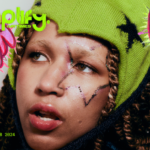
The West London artist on the game-changing plans behind their debut album, how they fell in love with Twilight’s emo vampire universe and why signing to Dirty Hit marks a new era.
WORDS BY ZOYA RAZA-SHEIKH
HEADER DESIGN BY YOSEF PHELAN
PHOTOGRAPHY BY CLARYN CHONG
STYLING BY AMY HOLDEN-BROWN
MAKE UP BY MAYA MAN
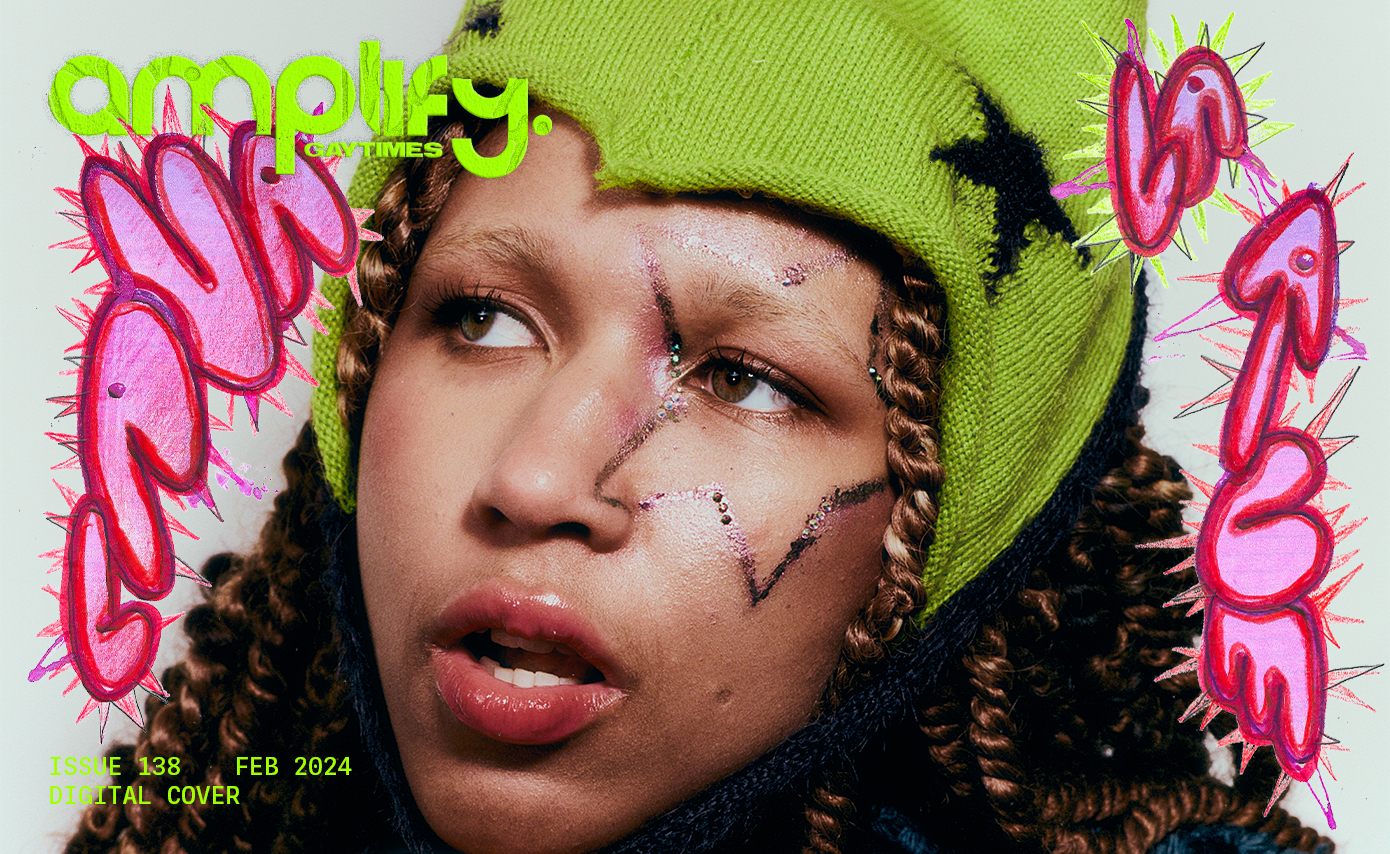
It’s a drizzly afternoon in Ladbroke Grove but that hasn’t stopped Lava La Rue – born Ava Laurel – from showing up in full stereo. We’re taking shelter in the headquarters of their new indie label, Dirty Hit, as they lead me to a boxy room that almost doubles as a trophy cabinet of the label’s success stories, with framed magazine covers of acts like Rina Sawayama, beabadoobee, Pale Waves and Wolf Alice.
As the 25-year-old musician leans back in their chair, their relaxed style – a pin badge-adorned trapper hat and distressed faded brown jumper – notably clash against the sterile white room. In these surroundings, we get down to speaking about what’s important to La Rue including the Arsenal Women’s football team and their love for emo-alt rock music.
But the main reason we’re here is to discuss their forthcoming debut album, a record that has evolved La Rue’s understanding of their own artistry. “[My new music] is not quite psychedelic rock and it’s definitely not fucking R&B or hip hop,” they say. “It takes elements of soul, funk, indie and punk and that’s how I’ve found the middle ground in my music.”
La Rue’s inspirations are varied – and this extends into their songwriting, and on their forthcoming project, they will be delving into topics of personal growth, queer love and political injustice. Naturally, creativity and personal identity intertwine for the musician, with their exploration as an artist allowing them to reach greater self-knowledge in all aspects of their life. “Understanding my genre identity has helped me understand my gender identity,” they say. “With genre, I grew up on Paramore and a lot of bands like Bloc Party. I was also inherently immersed in the UK hip-hop scene. I didn’t feel like one or the other.”
We caught up with the die-hard Gooner to hear more about their genre-blending new project and how Adventure Time gave way to their trippy vampire-inspired queer awakening.
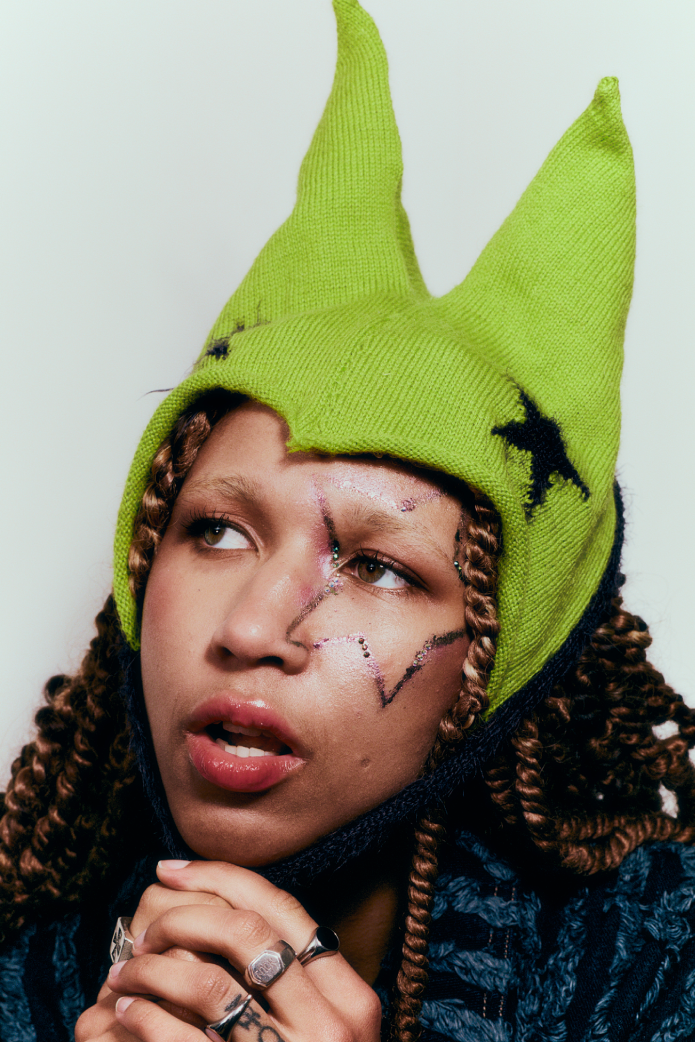
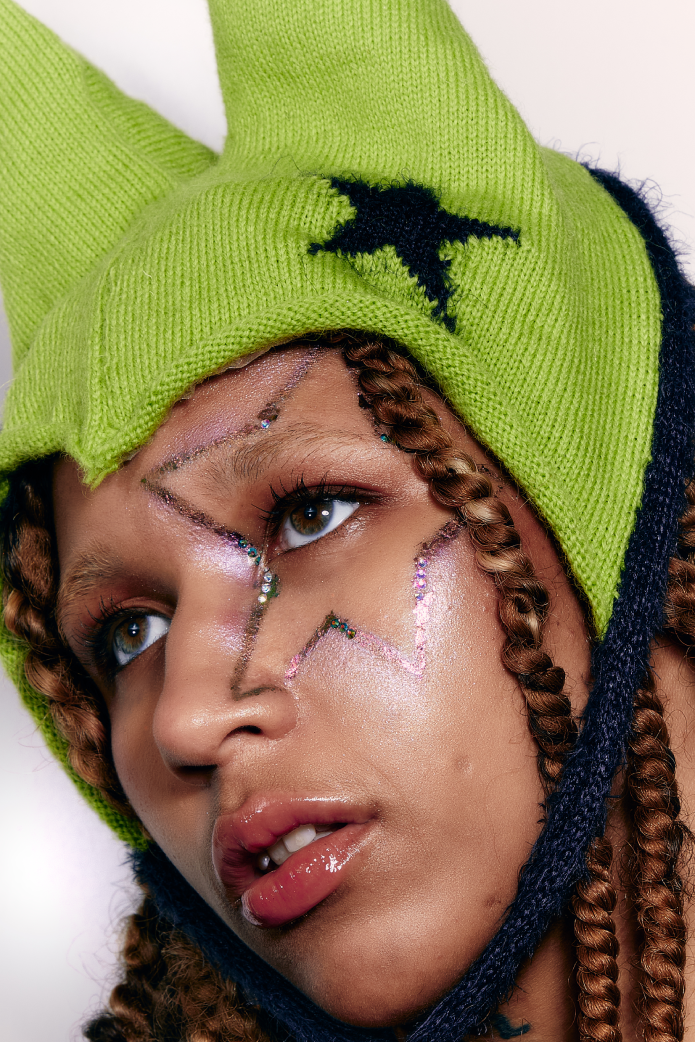
You’ve moved from independent record label Marathon Artists to the Dirty Hit roster which will see you stepping into new genre stylings and creative direction. As your two-EP deal with Marathon wrapped up in 2022, what drove your move to a new label?
I knew people who are with the label and I could get first-hand advice about what [the label] is like. I also knew I wanted to be with an indie at this stage, so it just felt right. What’s great about the Dirty Hit roster is that their artists are very clear with their creative identity and that [creative identity] definitely came with the artist’s way before they even signed to the label. I wanted to be somewhere where I could say, ‘This is how I like things,’ and ask how we can make it happen.
You’re six years on from your first single and now your debut album is on the way – how does it feel to be in the next phase of your music career?
This is gonna be such a funny analogy but, as someone who’s a K-pop stan, a lot of artists, who are the biggest in that world [of K-pop], train for up to seven years, sometimes more, before they debut. I feel like I’ve been training for my debut and just understanding myself and my identity. I’ve been building up to that moment.
2024 feels fitting [for releasing my debut]. It sounds weird but if I had debuted in the 2010s, there was so much I needed to figure out. If I had debuted just before the pandemic, there was no alternative category at the MOBO Awards. Alternative music wasn’t recognised as a Black genre in so many places.
Within the political environment, we’ve regressed [in progress]. You have to be the first person to open the door and a genre environment. It’s not just about being queer but needing an intersectional society, whether that’s to do with race or class. It’s annoying – I don’t want to have to be progressive, I just want to drop something and have a space ready like there is for everyone else.
You’ve mentioned that you’ve learned about yourself alongside your music. What did that growth look like?
It’s taken me from the time of conceptualising Lava to understand how I want to present. It’s quite funny because I think that understanding genre identity has helped me understand my gender identity. With genre, I grew up on Paramore and a lot of bands like Bloc Party. I was also inherently immersed in the UK hip-hop scene and I didn’t feel like one or the other.
I’ve grown up with a lot of brothers and a lot of really close male friendships and could never identify with the standards put upon femininity. I didn’t feel like I could relate to it. But, at the same time, I grew up around so many strong women and was treated by the world as a Black woman.
Now, to know that I can land on somewhere [non-binary identity] that isn’t either and I can fluctuate – this is exactly something I felt in the landing of my music.
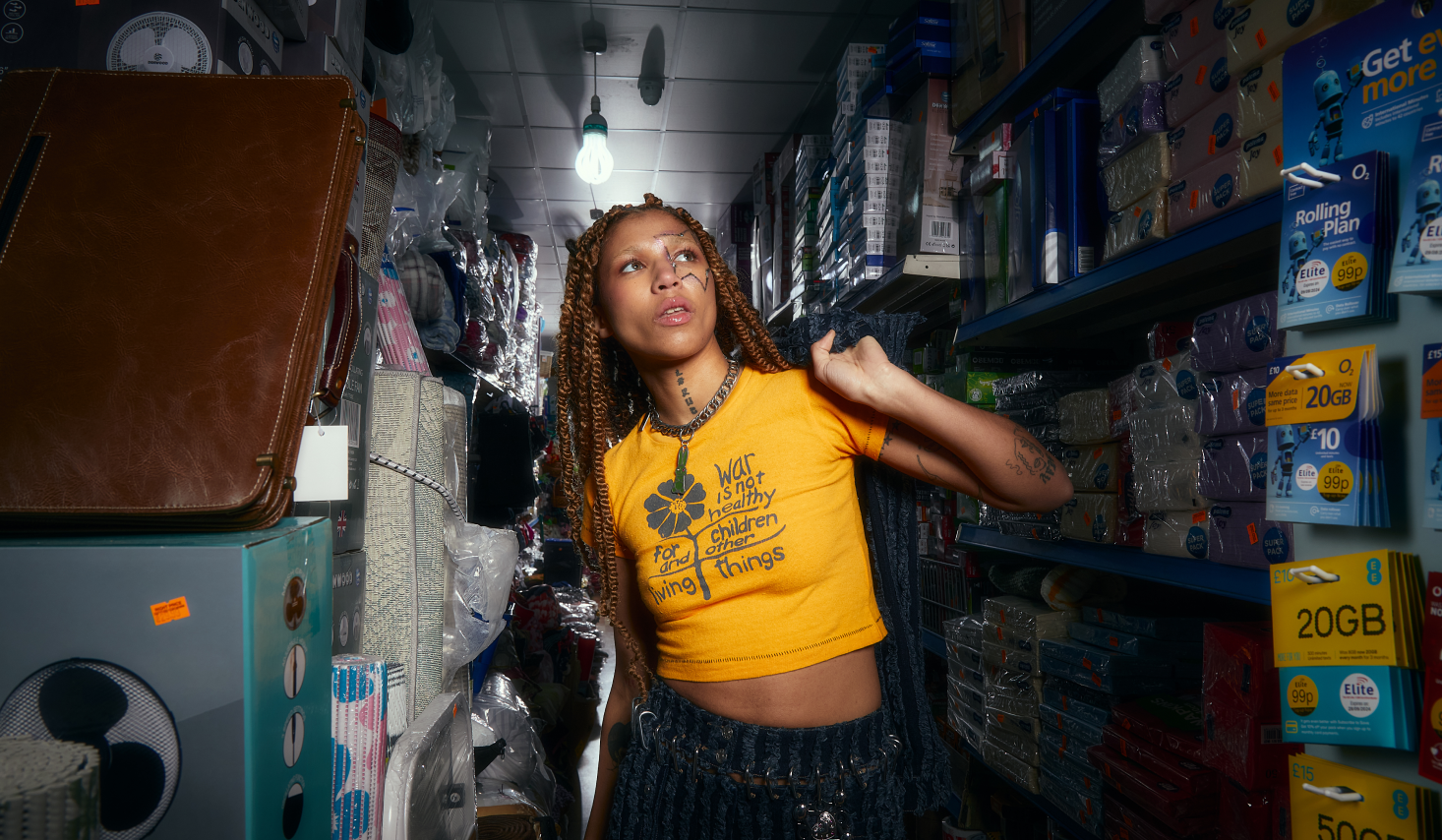
As well as being a musician, you’re a director and a visual artist. How does that skill tie into your music and artistic expression?
The direction I’m taking is world-building. I grew up a bit of a nerd and loved opening up a book or graphic novel and totally being in that world. As a kid, I’d read a book or like watch a film and I feel like I’m the character for the whole week, even if it was fucking Twilight. I read through the whole series, I’d go to school and I’d be like, ‘baby I’m a vampire,’ and I think it’s so important to never lose that. It’s so important to keep that love and fantasy so, for me, it’s all about creating that for my music career. It’s about creating lore, creating a narrative, a character and having something that people can follow and pick up the pieces.
What are some on queer on-screen moments that have artistically inspired you?
There are definitely queer TV moments that have caused whole brain shifts within me. The first one is Adventure Time and it’s going to be so cute, but was an early queer realisation moment; it was Marceline and Princess Bubblegum. I saw myself in Marceline so hard: I had a complicated family situation and was mixed. Marceline was played by a mixed-race person and has the same birthday as me – we were both born on the 21st of May.
Adventure Time was a children’s TV show written with a lesbian plot but there was no political agenda with that. [Marceline and Princess Bubblegum] were really strong characters that made so much sense. I learned so much from Adventure Time on how you can make meta, existential queer TV that’s enjoyable for adults too. I want my music and future projects to be like that. I want you to be able to listen to every single with no context and also be able to listen to it together so you can get a wider picture of it all.
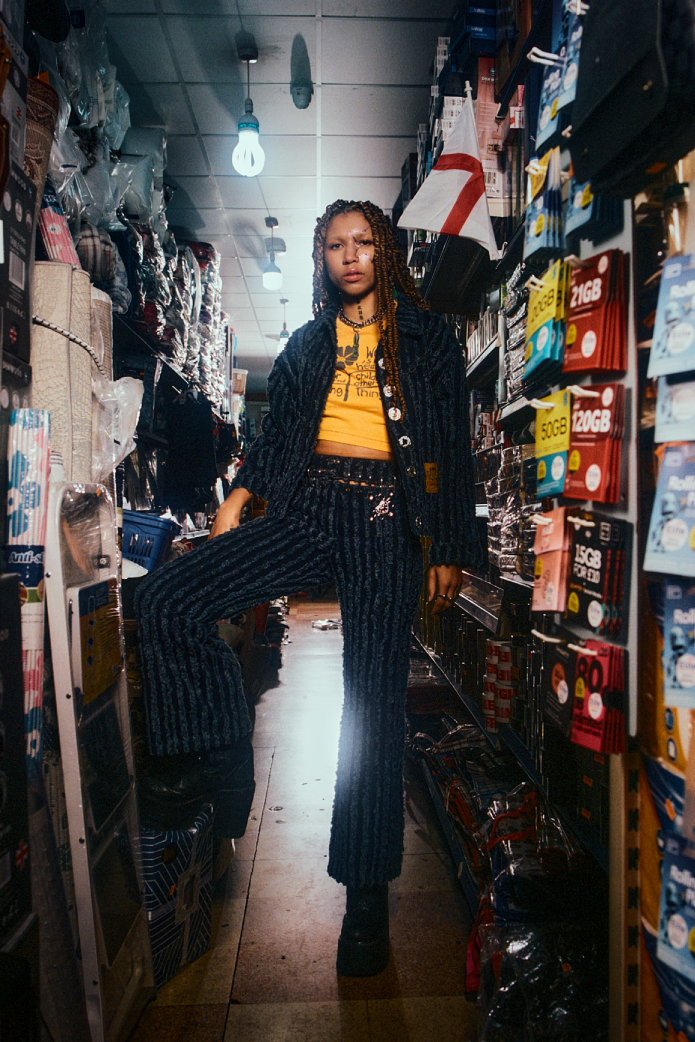
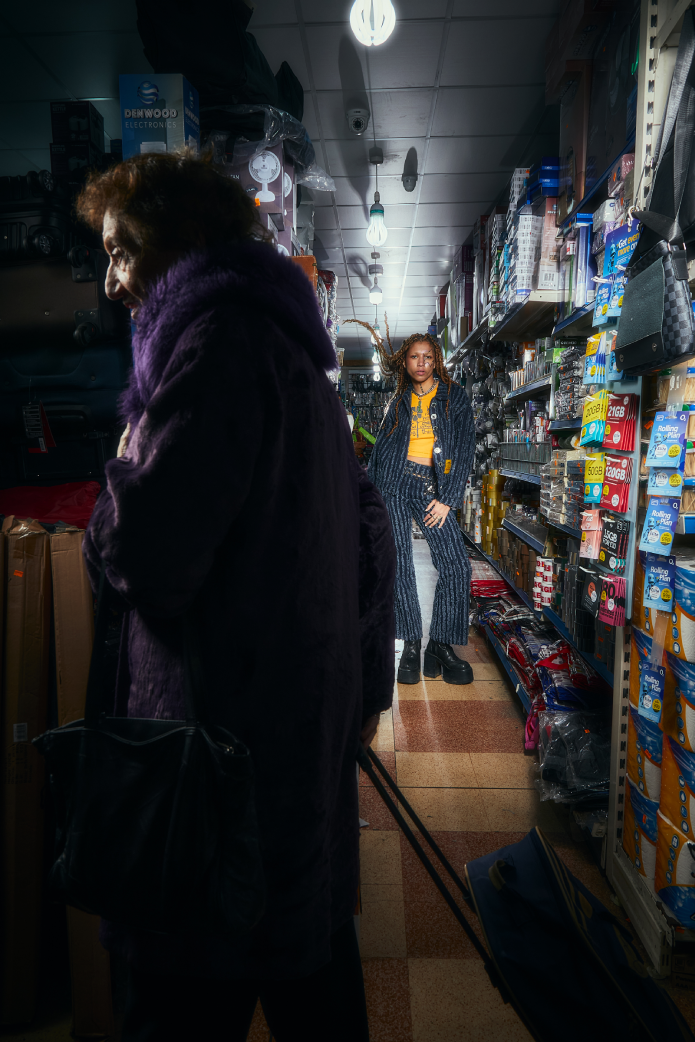
We’ve seen many interesting artists create their own worlds within music across singles and album concepts, from Tyler, the Creator to Rina Sawayama. As we’re celebrating your upcoming debut album, can you share your favourite debut albums by queer musicians?
It’s so funny you say that because there are so many artists that I grew up listening to who were queer but they didn’t come out [until years later] specifically Frank Ocean, Tyler, the Creator and Kele from Bloc Party.
I don’t want to be categorised and pinpointed into the queer scene. This is me as an artist and I just happen to be queer, but that comes secondary. A lot of my first queer albums were from queer people, it was queer music, but that was secondary to the sound. The sound reached out to everyone and that is also what I hope to do with my music.
We’ve also seen the success of queer artists in the alternative space, with acts like Rina Sawayama and Boygenius…
Totally! One thing I will say about Boygenius is that they are, hopefully, [helping the industry to recognise] that there are different queer demographics. Music that was supposed to be ‘queer music’ was so biased towards white queer men [and their tastes] to the point where people who aren’t queer artists became queer icons – it was all in the gay guy, club vibe. There’s such a difference now. If you look at how gay Boygenius are it’s very different to the glitter gay scene.
How would you summarise what fans can expect next from you?
I want to bring a bit of fantasy, rock and roll, psychedelia and queerness to the music scene. That’s the magic that I intend to bring back.
This conversation has been edited and condensed for clarity.
The post Final Fantasy: Lava La Rue is levelling up their lore appeared first on GAY TIMES.

0 Comments